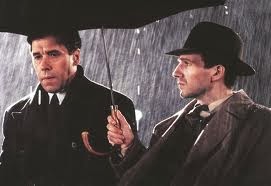The following is an excerpt from my latest novel, The Healing of Howard Brown. Some of my readers – those that know me, in particular – have observed that much of Book I is based on actual people and events. This is partially true. Like Charles Dickens in David Copperfield and Saul Bellow in Herzog and Humboldt's Gift, along with the esteemed jazz guitarist Barry Finnerty in START, there are parts of my work that are semi-autobiographical. After all, real life is about as powerful an inspiration an author can have.
My father, J. Stewart Harrison, did in fact hail from Baton Rouge, among other places in the South. His mother, Louise, was born on the Hazelwood Plantation in Laurel Hill, LA. Both of them were notorious "glass half empty" pessimists and maniacal golfaholics. The scene below is based on fact: my father and mother (to the degree my mother was capable of comprehension at that time) had agreed that dying was the end. Eternal nothingness awaited. This after raising my sister and me in the Catholic church. It seemed a bitter, dark outlook to me then, and still does, as evidenced in the excerpt below.
 |
| Now on Amazon |
From chapter one: "Trying to Die"
I closed my eyes as my Vicodin-laced
brain pulled sparkling clean memories out of the mental soup with pristine
clarity, and eventually recalled a scene of Mom and Dad and a pact they made
three years ago.
That day, the old man sat us down at the
kitchen table next to his overstuffed club chair. Then he cleared his throat as
if he was in the courtroom about to address the ladies and gentlemen of the
jury. “Mom and I have agreed that we don’t believe in any sort of life after
death,” he announced, leaning forward on the edge of his chair and running his
twisted fingers through his long, silver-blue hair. “We’ve decided that this is
the end.”
He looked like the end had already
happened, his giant hawk nose a roadmap of booze-busted capillaries, snot
perennially coalescing in the nostril fuzz, his grey eyes broken down into
pools of uninvited tears hiding in the shade of his overhanging silver brows,
his terse upper lip shielding what was left of his teeth.
My mother had no comment. Alzheimer’s had
made such concepts as “death” and “the end” as meaningful as “spoon” and
“poop.” She might have been wondering what happened to her usual daytime rerun companions:
Lucy, Ricky, Matt Dillon, the Brothers Cartwright, Bob Barker. She might have
even wondered why we kept her friends holed up in that box in the corner of the
kitchen.
But Hal Brown was serious, so I did what
I could to paint a brighter picture: “That’s the great thing about death, Dad. Nobody
knows for sure what happens so you can make up whatever you want.” This was
probably the most metaphysical thing I had ever said to him in my entire life,
and though both of my parents converted to Catholicism upon their arrival in
San Francisco, Dad from the South and Mom from Chicago, their religious
affiliations had more to do with blending into the City than with any faith in
the Holy Trinity. But as it turned out on that particular day, he wasn’t
interested a theological debate, nor was he interested in my theory of eternal
party after death, or even to make lively discussion over Pascal’s wager (which
to me was, and still is, the only logical way of looking at it). Instead, as
always, there was an immediate practical purpose, a command, a fatherly
directive that he meant to impart:
“Well, we don’t want any last rites or
anything like that. And if you put on a little memorial get together we don’t
want any priests or religion involved.”
Bullshit! I wanted to shout. If that’s how
you’ve decided it’s going to be then why did we waste all that time at St.
Sebastian’s getting baptized and going to catechism and getting confirmed and
playing CYO basketball? Was that all so you could play God in the Christmas
Pageant with your big ass God-like voice booming through the church? What about
all the stuff we learned about venial sin and mortal sin and how to decide
which was which and how big a mark a sin might leave on your soul and how much
penance you had to say to wash it off? Weren’t these the rules we were taught
to live by, so when we got to where you are now we could relax, knowing we were
going to Heaven to hang with Jesus and The Holy Ghost in super clean super
white robes and golden halos? Now you’re shitcanning the whole business, right
when it matters most? Now that you’ve spent your whole life paying the premiums
you’re saying you don’t want the insurance after all?
But I didn’t say any of that. I glanced
over at Mom who was now looking right at us. If the old man had his way, both
he and Mom would be holding hands and, on cue, the lights would go out.
Here, and then…flick! Nowhere. No pearly gates. No exit interviews.
No purgatory. No limbo.  |
| On Amazon |











